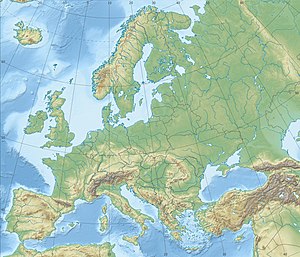Remove ads
The Battle of Schöngrabern, also known as the Battle of Hollabrunn, was an engagement in the Napoleonic Wars during the War of the Third Coalition, fought on 16 November 1805 near Hollabrunn in Lower Austria, four weeks after the Battle of Ulm and two weeks before the Battle of Austerlitz (Slavkov, Moravia - now Czech Republic).[3]
| Battle of Schöngrabern (or Hollabrunn) | |||||||
|---|---|---|---|---|---|---|---|
| Part of the War of the Third Coalition | |||||||
 Battle of Shengraben (of Hollabrunn) by K. Bujnitsky | |||||||
| |||||||
| Belligerents | |||||||
|
|
| ||||||
| Commanders and leaders | |||||||
|
| |||||||
| Strength | |||||||
| 20,661[2]–30,000[1] | 7,000[1]–7,300[2] | ||||||
| Casualties and losses | |||||||
| 1,200[2]–2,000[1] | 2,648[2]–3,000[1] | ||||||
War of the Third Coalition:
Austria
Austria
current battle
Napoleon in command
Napoleon not in command
Remove ads
The Russian army of Kutuzov was retiring north of the Danube before the French army of Napoleon. On 13 November 1805, Marshals Murat and Lannes, commanding the French advance guard, had captured a bridge over the Danube at Vienna by falsely claiming that an armistice had been signed, and then rushing the bridge while the guards were distracted. Kutuzov needed to gain time to make contact near Brno (Brünn) with reinforcements led by Buxhowden. He ordered his rearguard under Major-General Prince Pyotr Bagration to delay the French.[3]
Murat and Lannes commanded the 4th and 5th Corps and the Reserve Cavalry. Bagration took up a position about 6 km north of Hollabrunn, on the hill above the small town of Schöngrabern (today part of Grabern). Murat believed the whole Russian army was before him and hesitated to attack. Bagration then suggested to Murat that negotiations for an armistice should be opened. Murat agreed and did not attack.[3] When Napoleon was informed of this, he was furious and wrote to Murat:
I cannot find words to express my displeasure. You only command my vanguard and have no right to agree to an armistice without my orders. You will cost me the fruits of a campaign. End the armistice at once, and attack the enemy. Inform him that the general who has signed this has no power to make it, that only the Russian Emperor has the right, and that when the Russian Emperor ratifies this agreement, I will also ratify it. But it is only a ruse. March, destroy the Russian army. You are in a position to take his baggage and artillery.[4]
On 16 November 1805, Murat informed Bagration that the armistice would end at 5:00 pm. The confused action took place during the night. After sustaining several French assaults and holding the position for six hours, Bagration was driven out and executed a skilled and organised withdrawal to retire northeast to join the main Russian army. His skillful defence in the face of superior forces successfully delayed the French enough for the Russian forces of Kutuzov and Buxhowden to unite at Brno (Brünn) on 18 November 1805.[5]
Remove ads
The battle is depicted in Leo Tolstoy's novel War and Peace. Prince Andrei Bolkonsky is present and attaches himself to the artillery battery of Captain Tushin. As the battle progresses, the battery ends up alone and unsupported, becoming the deciding factor in the successful withdrawal of the Russian troops. Later that evening, some Russian staff officers accused Captain Tushin of abandoning his artillery pieces rather than retreating with the guns as ordered. Prince Andrei tells Bagration that there were no supporting Russian troops and that Captain Tushin and his men might have been vital in delaying the French advance.[6]: 105–117
Given the lack of detail in historical sources for this battle, it is unclear how closely Tolstoy's version of the battle relates to the historical action.
Remove ads
Wikiwand in your browser!
Seamless Wikipedia browsing. On steroids.
Every time you click a link to Wikipedia, Wiktionary or Wikiquote in your browser's search results, it will show the modern Wikiwand interface.
Wikiwand extension is a five stars, simple, with minimum permission required to keep your browsing private, safe and transparent.
Remove ads

